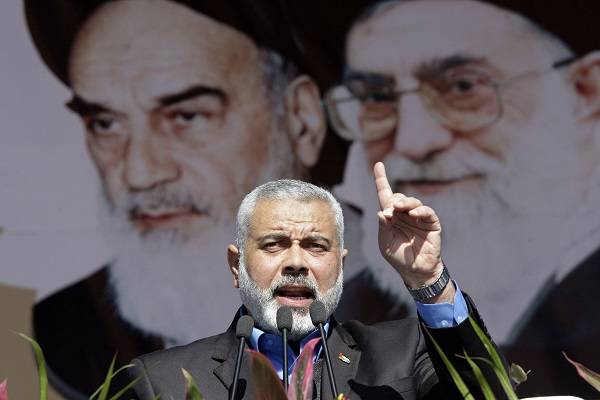Iran ‘congratulated’ the Hamas terrorist organization for its belligerence related to the Jewish state and its refusal to disarm as a precondition to joining the Palestinian unity government.
A delegation led by Hamas deputy chief Salah al-Arouri landed in Tehran on Friday for top-level meetings with Iranian officials. An official of the terror group told AFP that they had come to report on the recent reconciliation meetings held with the Palestinian Authority (PA). Hamas has reportedly agreed to let the PA resume its administrative governance over the Gaza Strip in exchange for keeping its extensive military force intact.
In reaction to this deal, the Israeli government, backed by the United States, stated that there would be no negotiations with the “united” Palestinian factions unless Hamas recognized Israel, disarmed, and severed its ties with Iran. Al-Arouri, who currently lives in exile in Beirut, flatly rejected those conditions, saying, “We’re not in the stage of recognition; rather we are now in the stage of preparing to eliminate the Zionist entity…. Our visit to Tehran is our practical rejection [of] the Israeli demand to cut ties with it.”
Ali Akbar Velayati, senior adviser to Iran’s Supreme Leader Ayatollah Ali Khamenei in international affairs, praised Hamas for sticking to its founding ideology. “We congratulate you for declaring that you will not set your weapons aside and for describing it as your red line,” he said, according to the semi-official Fars news agency.
Regarding Iran’s support for the Palestinians, he stated, “We want to prove to the Zionist entity that strategic relations between Iran and the Palestinian resistance, represented by Hamas and Islamic Jihad, will not ever be severed. Rather, Iran’s support for the resistance will increase day by day.”
Two other top Iranian officials, Admiral Ali Shamkhani, secretary of the Supreme National Security Council, and the speaker of the Iranian parliament, Ali Larijani, also praised Hamas’ stance in their meetings.
This is the second meeting in three months between Hamas and important members of Islamic Republic’s leadership. According to Al-Monitor, an Arab media site based in Washington, D.C., the election earlier in 2017 of Ismail Haniyeh to replace Khaled Mashal as Hamas’ head brought about a warming of relations between the erstwhile client organization and its financial patron that had been strained by Hamas disapproval of Iranian support for Bashar Assad in the Syrian civil war.
Al-Monitor reported that after the internal elections in May, Qasem Suleimani, commander of the Quds Force of the Islamic Revolutionary Guard Corps, sent Haniyeh a congratulatory message. In it, he said that he was looking forward to what he described as a ”wise administration” from the new Hamas leadership to promote integration with what he described as their fellow allies in the resistance axis led by Iran.
While Iran was angered by Hamas’ reaction to the Syrian conflict, it never completely turned off the spigot of support to Hamas terrorists. Khaled Kaddoumi, Hamas’ representative in Iran, acknowledged this, telling Al-Monitor, “Regardless of its size, the political, financial and military support provided by Iran to Hamas never stopped.”
Iran’s ability to support terrorist organizations like Hamas was greatly enhanced when it agreed in 2015 to the nuclear deal known as the Joint Comprehensive Plan of Action (JCPOA) with the five permanent members of the UN Security Council, Germany and the EU. Sanctions that had almost crippled the country economically were removed and Iran gained hundreds of millions of dollars almost immediately. It also signed several huge business deals and resumed selling oil on the open market, bringing in even more revenue.
By: Batya Jerenberg, United with Israel
